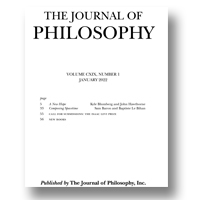|
|
|
1.
|
The Journal of Philosophy:
Volume >
112 >
Issue: 8
P. Kyle Stanford
"Atoms Exist" Is Probably True, and Other Facts That Should Not Comfort Scientific Realists
abstract |
view |
rights & permissions
| cited by
Critics who use historical evidence to challenge scientific realism have deployed a perfectly natural argumentative strategy that has created a profoundly misguided conception of what would be required to vindicate that challenge. I argue that the question fundamentally in dispute in such debates is neither whether particular terms in contemporary scientific theories will be treated as referential nor whether particular existential commitments will be held true by future scientific communities, but whether the future of science will exhibit the same broad pattern of repeated, profound, and unpredictable changes in theoretical orthodoxy that such historicist critics argue characterizes its past.
|
|
|
|
|
|
|
2.
|
The Journal of Philosophy:
Volume >
112 >
Issue: 8
Jennifer Wang
Actualist Counterpart Theory
abstract |
view |
rights & permissions
| cited by
Actualist counterpart theory replaces David Lewis’s concrete possible worlds and individuals with ersatz worlds and individuals, but retains counterpart theory about de re modality. While intuitively attractive, this view has been rejected for two main reasons: (i) the problem of indiscernibles and (ii) the Humphrey objection. I argue that in insisting that ersatz individuals play the same role as Lewisian individuals, actualists commit the particularist fallacy. The actualist should not (as commonly believed) require stand-ins for every Lewisian individual. Ersatz individuals should instead be construed as representations of actually existing qualitative ways for individuals to be, or qualitative properties individuals can instantiate. This necessitates changes elsewhere. Non-instrumental uses of Kripke semantics and standard counterpart semantics also require stand-ins for particular non-actual individuals. I argue that the actualist should instead adopt a non-standard counterpart semantics that more clearly illuminates the role that actual properties and relations play in explaining de re possibilities and necessities. The result is an intuitive and forceful reply to both the problem of indiscernibles and the Humphrey objection.
|
|
|
|
|
|
|
3.
|
The Journal of Philosophy:
Volume >
112 >
Issue: 8
Matthew Rendall
Mere Addition and the Separateness of Persons
abstract |
view |
rights & permissions
| cited by
How can we resist the repugnant conclusion? James Griffin has plausibly suggested that part way through the sequence we may reach a world—let us call it “J”—in which the lives are lexically superior to those that follow. If it would be preferable to live a single life in J than through any number of lives in the next one (“K”), then it would be strange to judge K the better world. Instead, we may reasonably “suspend addition” and judge J superior, as if aggregating the lives in the larger world intrapersonally. I argue that the addition of new people with separate preferences renders this inference illicit when comparing J+ and K. When one pairwise comparison suspends addition and the other does not, the result is an intransitive value judgement: J ≤ J+ < K < J, producing the mere addition paradox.
|
|
|
|
|
|
|
4.
|
The Journal of Philosophy:
Volume >
112 >
Issue: 8
New Books: Anthologies
view |
rights & permissions
| cited by
|
|
|
|
